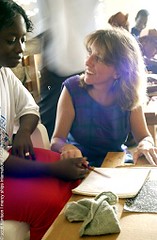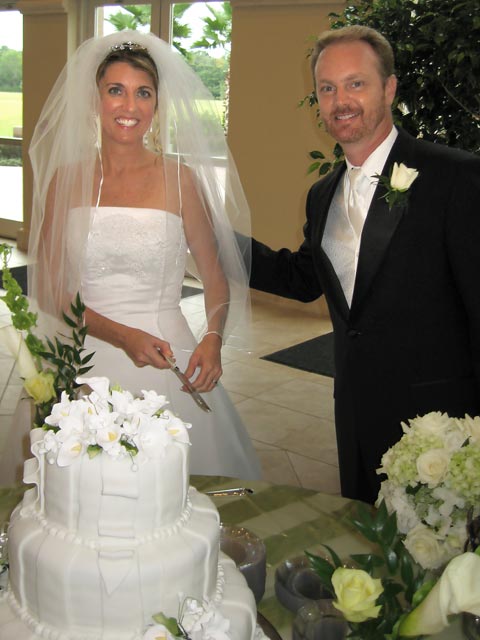Beatrice's Burden
The following is from our Communication's department and comes at a time when I ask, "what am I doing here?" Thank you Lord for your answer.
The sun rose over Monrovia’s John F. Kennedy Memorial Hospital chasing away the early-morning cool as a long line formed outside the hospital doors. People who usually hid their afflictions waited patiently, now seeking respite only from the hot sun. Tumours, cleft lips, bullet wounds and keloids marred the faces and bodies of those praying for a miracle.
A forty-year-old woman stepped out of the line and slumped onto the curb, head in hands. The weight of her face seemed to crush her already emaciated frame and she held it as though weary from carrying such a load for so long. She raised her head, exposing the huge tumour growing out of her mouth. It had forced its way through her teeth, into her left eye and bulged out from her cheek. She held a small green towel over it in a futile effort to hide her shame from the world. She dropped her head again and stared despondently at the cement.
Nurse Ann Giles, a veteran at picking out the ones who needed pushing up the line, could see this woman was too exhausted to wait much longer. It seemed as though she had almost given up.
Ann discovered that her name was Beatrice and her 20-year old son Alphonso had patiently and faithfully kept her place in line. She took them straight through to the waiting room. Even after jumping the line, it took four hours for Beatrice to make it from the waiting room to the scheduling desk. But finally, she held an orange card with a surgery date, marking the first triumph in her lengthy struggle to rid herself of deformity.
"She was in a room in darkness all the time," recalled Alphonso. The eldest of Beatrice’s four children, he struggled to remember his mother’s face without the tumour. "I was a petty trader, selling small things like cassava and pepper. I had been a seller since my youth. But when the tumour came, I was ashamed to go among people," Beatrice explained. As she sat up in her bed on the ship’s ward and retold the story of her suffering, her hands frequently moved to her face to touch the place her tumour used to be. She came to the Mercy Ship Anastasis at the beginning of April with very little hope but said her faith in God and a determination to see her affliction gone kept her going.
"Before I heard about the ship, I gave up and was looking to God for healing because I could not find my way through anywhere else. People were telling me to go this way and that and nothing worked. I was frustrated. It’s all I can remember. My only focus was to get healed." As she spoke her fingers absentmindedly touched her cheek and a small, shy smile spread across her lips.
When Beatrice came to the ship she was severely malnourished. With the tumour taking up much of her mouth, she was unable to push much food into her throat and it impeded her ability to chew. She weighed only 88lb and her haemoglobin levels were dangerously low, making her severely anaemic. Although the growth in Beatrice’s mouth was not malignant, it still threatened her life.
News that a tumour is benign spells relief for anxious patients in the developed world where such things are noticed small and taken care of in a timely fashion. For many West African people suffering with a benign growth like Beatrice’s, the tumour sentences the sufferer to a slow, painful death. In Liberia, a nation recently emerged from civil war, there is one doctor to every 50,000 people. For the vast majority of Liberians barely scraping past the poverty line, extras like basic healthcare are out of reach.
"Beatrice was very frail. She was on the cliff’s edge when she came to us. Maybe she had about three more months. It is difficult to say how she would have died. It could have been chronic malnutrition with final collapse, but she was also close to slow suffocation," explained Dr. Gary Parker, one of the surgeons who removed Beatrice’s 6lb tumour.
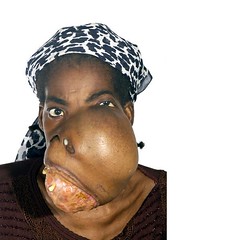
Beatrice underwent surgery onboard the Mercy Ship on April 1 Dr. Parker and Dr. Tony Giles took four hours to remove the tumour along with the upper jaw bone that had been destroyed by the tumour’s inexorable growth. He replaced the bone with muscle from the side of her skull in order to re-establish the functional barrier between the eye socket, nose,sinuses and mouth; otherwise a large hole would have remained between these features.
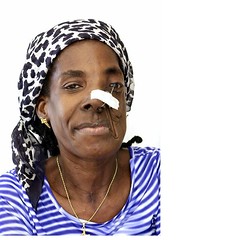
Dr. Parker plans to do a further surgery for Beatrice when the ship returns to Liberia later in the year.
"We will take some of the hip bone and use it to shape the left cheek where the tumour was removed. At the moment, the skin that has been stretched tight by the tumour is loose. Much of it will shrink back into place but what remains, we will cut back."
Beatrice took a little longer than most to recover because of the severity of her condition. In spite of this, the change in her emotional condition was as dramatic as her physical transformation. The nurses on the ship’s ward noticed the development as Beatrice passed her two-week stay onboard.
"Beatrice is healing well and I am so blessed to see this lady with such a sweet spirit on the ward dance and praise God for His healing and restoration in her life," said Lisa Scharf, a nurse.
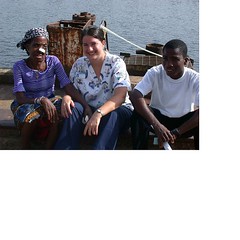
The day Beatrice left the ship to return home, rain poured from the sky, soaking everything in minutes. Yet nothing could dampen her spirits as she waited inside for Alphonso to come and collect her. She fidgeted excitedly, taking pictures with her new Mercy Ships friends who had come to the ship’s gangway to see her off. Soaked to the skin and huddled under a coat borrowed from the ship’s security guard, Alphonso shook hands with the waiting crew members. "I see my mother now and I tell God ’thank you’. Now she will walk outside. Taxis will no longer pass her by." He gently took his mother’s arm, held an umbrella over her and led her down the gangway to a waiting car. The light from the headlights flashed against the rain as the car drove away from the ship, carrying Beatrice away to a new life.
